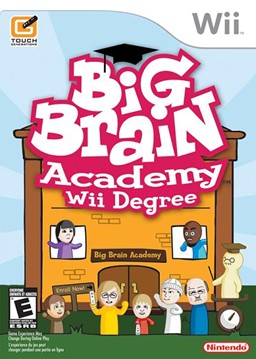A multiplayer video game is a video game in which more than one person can play in the same game environment at the same time, either locally on the same computing system, on different computing systems via a local area network, or via a wide area network, most commonly the Internet. Multiplayer games usually require players to share a single game system or use networking technology to play together over a greater distance; players may compete against one or more human contestants, work cooperatively with a human partner to achieve a common goal, or supervise other players' activity. Due to multiplayer games allowing players to interact with other individuals, they provide an element of social communication absent from single-player games.
A massively multiplayer online game is an online video game with a large number of players to interact in the same online game world. MMOs usually feature a huge, persistent open world, although there are games that differ. These games can be found for most network-capable platforms, including the personal computer, video game console, or smartphones and other mobile devices.
The Wars series, also known as Famicom Wars and Advance Wars, is a series of military-themed turn-based strategy video games, predominantly developed by Intelligent Systems and published by Nintendo. The series debuted in Japan in August of 1988 with the original Famicom Wars, followed by sequels on the Super Famicom and Game Boy. These early installments were released in Japan, with Advance Wars (2001) being the first to reach the North American and European markets. Advance Wars was released in the United States on September 10, 2001, but put on hold in Japan and Europe due to the September 11 attacks. Although released in Europe in January 2002, neither Game Boy Advance game was released in Japan until the Game Boy Wars Advance 1+2 compilation, which released for the Game Boy Advance on November 25, 2004. The success of Advance Wars in the West is frequently credited as a driving force for Nintendo bringing Intelligent Systems' franchise Fire Emblem outside of Japan, as both series share a similar tactical gameplay style.
A cooperative video game, often abbreviated as co-op, is a video game that allows players to work together as teammates, usually against one or more non-player character opponents (PvE). Co-op games can be played locally using one or multiple input controllers or over a network via local area networks, wide area networks, or the Internet.
A multitap is a video game console peripheral that increases the number of controller ports available to the player, allowing additional controllers to be plugged in simultaneously in a manner similar to a power strip or a USB hub. A multitap often takes the form of a box with three or more controller ports which is then connected to a controller port on the console itself.

XLink Kai is a program developed by Team XLink allowing for online play of video games with support for LAN multiplayer modes. It enables players on the GameCube, Nintendo Switch, PlayStation 2, PlayStation 3, PlayStation 4, PlayStation Portable, PlayStation Vita / PlayStation TV, Xbox, Xbox 360, and Xbox One to play games across the Internet using a network configuration that simulates a local area network (LAN). It notably also allows original Xbox games to be played online again following the Xbox Live shutdown on 21 April 2010 and certain GameSpy titles such as Saints Row 2 to be played online after the GameSpy network shutdown on 31 May 2014.

Wii Sports is a 2006 sports simulation video game developed and published by Nintendo for the Wii video game console. The game was released in North America along with the Wii on November 19, 2006, and in Japan, Australia, and Europe the following month. It was included as a pack-in game with the console in all territories except Japan, making it the first sports game included with the launch of a Nintendo system since Mario's Tennis for the Virtual Boy in 1995. The game was later released on its own as part of the Nintendo Selects collection of games.

WarioWare: Smooth Moves is a party video game developed by Nintendo and Intelligent Systems and published by Nintendo on the Wii. It was released in Japan in December 2006, and in Europe, North America, and Australia in January 2007. It is the fifth game in the WarioWare series of games, and the only game in the series to be physically released for the Wii. Like its predecessors, WarioWare: Smooth Moves is built around a collection of microgames that last about five seconds each, and which require that the player hold the Wii Remote in specific positions. The game offers the microgames to the player in rapid succession, by first instructing the player to hold the Wii Remote in a specific manner, and then showing them the microgame. The microgames are divided into several stages, each of which loosely connects the microgames with the help of a story. Additionally, this was the first spin-off Mario game to be released for the console.

Pokémon Battle Revolution is a turn-based strategy video game in the Pokémon series developed by Genius Sonority and published by The Pokémon Company and Nintendo. It was released for the Wii on December 14, 2006, in Japan; on June 25, 2007, in North America; on November 22, 2007, in Australia, and on December 7, 2007, in Europe. Along with being the first Wii incarnation of the Pokémon video game franchise, it is also the first Wii game to use the Nintendo Wi-Fi Connection in North America and Japan and the second Wii game to wirelessly interact with the Nintendo DS handheld.

Wii Play is a party video game developed and published by Nintendo for the Wii console. It was released as a launch game for the console in Japan, Europe, and Australia in December 2006, and was released in North America in February 2007. The game features nine minigames, including a Duck Hunt-esque shooting range, a fishing game, and a billiards game, each of which are designed to showcase the features of the Wii Remote controller.
Cheating in video games involves a video game player using various methods to create an advantage beyond normal gameplay, usually in order to make the game easier. Cheats may be activated from within the game itself, or created by third-party software or hardware. They can also be realized by exploiting software bugs; this may or may not be considered cheating based on whether the bug is considered common knowledge.

Big Brain Academy: Wii Degree, known in PAL regions as Big Brain Academy for Wii, is a video game released for the Wii. A sequel to the game Big Brain Academy for the Nintendo DS, it too measures a player's brain's weight, but with new games and puzzles to solve. The game makes use of Miis and uses WiiConnect24 features, allowing competition amongst users' friends, whose codes are automatically imported from the Wii's internal address book.

Mario Party DS is a 2007 party video game developed by Hudson Soft and published by Nintendo for the Nintendo DS. It is the second handheld game in the Mario Party series, as well as the last game in the series to be developed by Hudson Soft, as all subsequent titles have been developed by Nintendo Cube. The game was re-released on the Virtual Console for the Wii U in 2016.
Timekeeping is relevant to many types of games, including video games, tabletop role-playing games, board games, and sports. The passage of time must be handled in a way that players find fair and easy to understand. In many games, this is done using real-time and/or turn-based timekeeping. In real-time games, time within the game passes continuously. However, in turn-based games, player turns represent a fixed duration within the game, regardless of how much time passes in the real world. Some games use combinations of real-time and turn-based timekeeping systems. Players debate the merits and flaws of these systems. There are also additional timekeeping methods, such as timelines and progress clocks.

A game is a structured type of play, usually undertaken for entertainment or fun, and sometimes used as an educational tool. Many games are also considered to be work or art.

Worms: Battle Islands is an artillery turn-based strategy developed by Team17 and part of the Worms series, released for the PlayStation Portable and Wii in 2010. Players take turns controlling teams of anthropomorphic worms and using whatever means at their disposal to destroy opposing teams and become the one with the last team surviving. Both versions of the game were released to mixed reviews.

Wii Sports Club is a 2014 sports simulation video game developed by Nintendo and Bandai Namco Studios and published by Nintendo for the Wii U. It is the third entry in the Wii Sports series, following Wii Sports Resort (2009), a part of the larger Wii series. As an enhanced remake of the Wii launch title Wii Sports (2006), it includes five minigames that replicate tennis, baseball, bowling, golf, and boxing, and are controlled with motion controls that replicate the sports.
Since the origin of video games in the early 1970s, the video game industry, the players, and surrounding culture have spawned a wide range of technical and slang terms.

In video games with online gaming functionality, also called cross-compatible play, cross-platform play, crossplay, or cross-play describes the ability of players using different video game hardware to play with each other simultaneously. It is commonly applied to the ability for players using a game on a specific video game console to play alongside a player on a different hardware platform such as another console or a computer. A related concept is cross-save, where the player's progress in a game is stored in separate servers, and can be continued in the game but on a different hardware platform.










